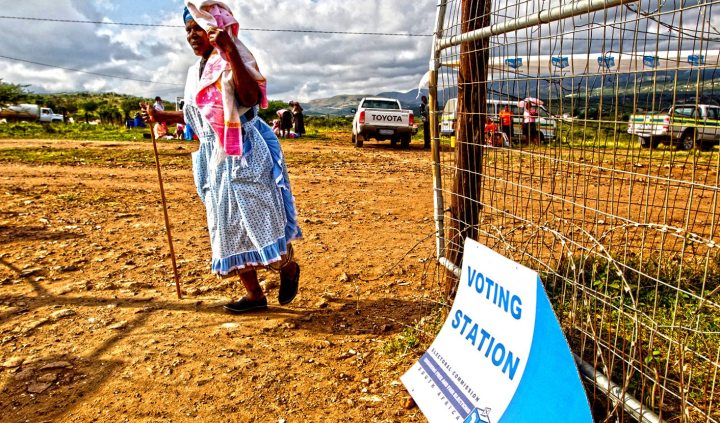South Africa
Parliament Diary: Let the elections games begin

There’s no date yet for the 2016 local government elections – not even word by when the date could be set – but electioneering is in full swing. Sometimes it’s blatant. Sometimes it is more subtle, as happened on Tuesday when deputy president Cyril Ramaphosa accepted the atlas of 2014 election results from the Electoral Commission of South Africa (IEC) at a photo op ceremony in Parliament. By MARIANNE MERTEN.
“It contains the election results for 2016… The process you think you are going through… is already predetermined. Go ahead and do as you wish. The results are already in place,” quipped Ramaphosa off the cuff to assembled political party leaders, or senior representatives, Parliament’s political heads and the IEC top brass.
He must have been referring to the slide in the atlas showing South Africa largely in green, the colour allocated to the ANC. But the patches of yellow, representing the DA, increase in size towards the south of the country, the Western Cape, where there are just a few pinheads of green.
Not that this is anything new – the 2014 election results resulted in the ANC gaining 62% of the vote and 249 MPs, while clinching all provinces but the Western Cape – but the slide looks nice.
“While the atlas of results shows how votes were politically distributed within certain geographies in the country, we must be clear that these concentrations must not be considered immutable,” said the deputy president of the country, and the governing party, in his formal address. “No part of the country should be considered the inalienable political turf of any one party. We cannot tolerate no-go areas.”
The atlas is full of information, and comparative analysis of previous election results going back to 1999 and down to provincial and metro level. The atlas was touted at Tuesday’s handover ceremony as a tool for political parties to plan and chart their 2016 local government election campaign.
Right now the governing ANC is in the driving seat. Several of its ministers are discussing the election date, and no doubt there is liaison with Luthuli House, informally or more structured. An election date is key for political parties to focus campaigns, to ensure they don’t run out of money for rallies, broadcast and print adverts, t-shirts, caps and other election paraphernalia.
The word is that the poll will be held in early August. In his State of the Nation Address (SONA) President Jacob Zuma said “local government elections will be held within three months after the 18th of May”. That’s in line with the law, which gives a three-month window either side of the last election date.
Co-operative Governance Minister Des van Rooyen, who must decide on a date for the president to announce before it is published in the Government Gazette, on Tuesday kept mum about the election date. But he confirmed to Daily Maverick that the technical committee has already met and soon the political committee he chairs, including the SAPS and South African Defence Force (SANDF) will also meet.
There’s a lot the electoral commission has done on its election countdown timetable: next week there’ll be a ward list, in mid-March the first provisional maps of the 4,392 wards. Activities will be escalated in the run-up to the first voter registration drive over the weekend of March 5 to boost the currently just over 25 million registered voters, particularly in the 18 to 29 age group.
Amid all these crucial logistical matters, the electoral commission faces its own challenges. Opposition parties have slammed the appointment to the electoral commission of Glen Mashinini, once a presidential special adviser. However, it is understood Mashinini has tackled this head on within the commission, not shying away from dealing with such perceptions.
But on Tuesday Mashinini was more the diplomat, allocating MPs questions on the IEC briefing on electoral preparations to members of his team. At the earlier atlas handover ceremonies, Mashinini stayed on what he called “safer ground”, the demographic analysis of voter-turn out and demographics.
The road to the 2016 municipal poll may yet be a long one. DM
Photo: A woman arrives at the polling station during the South African municipal elections in Nkandla, some 240 km (149 miles) north of Durban, May 18, 2011. REUTERS/Rogan Ward
Read more:
- The IEC Atlas of Results for the 2014 National and Provincial Elections is available for download on the electoral commission website www.elections.org.za















 Become an Insider
Become an Insider